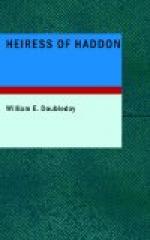Moore.
It was upon the third day after the occurrences narrated in the last chapter had taken place that a lonely traveller might have been seen urging his way across the fields just outside the town of Nottingham. The gates closed at dusk: it was now past sunset, and he hastened forward to gain admittance.
It was the man known at Haddon by the name of Nathan Grene, the locksmith, whose actions had ever been at variance with his character, and whose nature had always seemed to have been unequally yoked with the common occupation of a smith.
Nathan, in fact, was no true smith. He was a brother-in-law of Sir Ronald Bury, and having taken up the practice of astrology and alchemy, this fact had been seized upon by his foes, and he had been obliged to fly in disguise to save himself from one of those persecutions which were so readily and frequently levelled against the followers of the “black arts.”
In the character of a locksmith he had lived for some months in an uneasy state of security at Haddon. The lack of comfort which he was compelled to experience in his new position being compensated for in some small degree by the kind attentions he had received at the hands of the widow Durden, which began directly upon his arrival, and which soon rapidly ripened into a sincere regard for each other, and from that eventually progressed into love.
Being well born, Nathan Grene—or rather Edmund Wynne, for such was his proper name—had never taken kindly to the conditions imposed upon him by the disguise he had chosen to assume. He had never sought for work, and had done as little of it as he possibly could, and he had held aloof from the people around him, treating them with a supercilious indifference which they were not slow to resent. Under such conditions it was by no means surprising that he was decidedly unpopular in the neighbourhood, and the dislike to him was heightened by the intimacy which grew up between himself and the woman who was regarded as a witch.
It was for his vigorous defence of Mary Durden that he had been placed in the stocks. His whole spirit revolted from such a degradation; he had pleaded and had raged, but all in vain, and even Dorothy’s appeal on his behalf had failed to save him from the bitter humiliation.
The ordeal, again, had been a very trying scene for him, and his annoyance was more than doubled when he saw how his beloved was being persecuted by her neighbours and oppressed by the baron. As she escaped through the gateway he made up his mind to strike Sir George down, but in spite of his resistance he was carried out beyond the limits of the Hall in the wild rush that took place when the first moment of surprise and terror had passed away.
All night long he lay upon the floor of his little smithy pondering schemes of revenge, but when he ventured out on the following morning all his ideas were dispelled by the sight which met his gaze, for there was Mary Durden hanging from the branch of a tree at the foot of the slope which led up to the gateway of the Hall.




